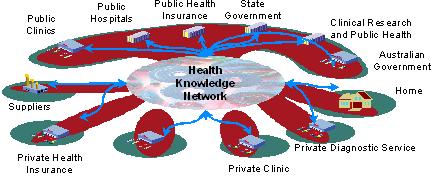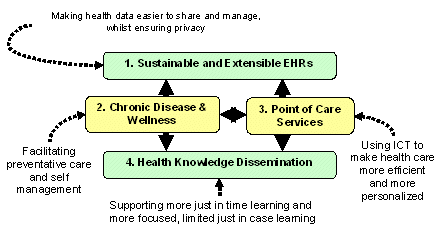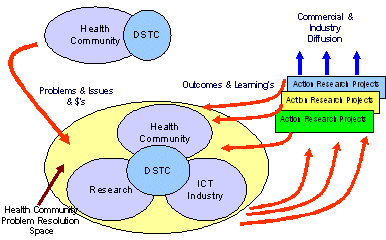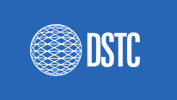DSTC’s research into health has
focussed on improving the quality, safety and efficiency of health
care through the application of whole-of-sector collaborative
information and knowledge sharing tools. National approaches to
electronic health records, service coordination and knowledge
dissemination are seen as key drivers for our research program.

DSTC’s Health R&D Program focuses on a number of topics
related to a whole-of-sector health ICT infrastructure. A national
Electronic Health Records (EHR) network is the starting point
for better health care, allowing providers to spend less time
on paper work and more time on providing high quality care. This
network can be extended to enable better coordination between
health providers, and other organisations participating in the
health industry, and greater self-management of their health by
consumers. Aggregated health information allows more precise identification
of public health trends leading to superior resource allocation
and risk management. Health workers can be kept up-to-date with
clinical innovations using priorities derived from day-to-day
needs and broader trends.
 Sustainable and Extensible National EHR Network:
Sustainable and Extensible National EHR Network:
New tools are required, which can enhance the ability of the national
EHR network to effectively integrate complex, evolving health
information accumulated over a patient’s lifetime and to
support rapidly emerging clinical and wellness knowledge. New
types of health information must be integrated to reflect new
medical knowledge (e.g. images and genetics) and new types of
health care delivery (e.g. home care or consultations with Pharmacists).
Patient consent must be implemented and access to health records
audited. Issues of scale, complexity of information, evolution
of data standards, semantic interoperability, effective data summarisation
for clinical purposes, querying for “secondary” uses,
privacy and trust all need to be addressed.
Health Knowledge Dissemination: A framework is
required, to enable the delivery of individually tailored education
and training to providers and consumers. This framework needs
to be sensitive to the current context (i.e. the immediate needs
as well as the longer-term care or training plan) and current
knowledge levels.
Chronic Disease and Wellness Management: A number
of consumer-centric health technologies are needed, including
personalised views of health record information using commonly
understood concepts in place of medical concepts, tools to support
self help and independent living, management of chronic disease,
wellness management program development and monitoring, and individualised
health education based on best practice clinical pathways. These
technologies will personalise the delivery of information and
services, using context gained from family history, genetic data,
localised evidence, and relevant lifestyle and health status data.
Intensive planning tools are required for the definition of long-term
care plans.
Point-of-Care Services: Delivery systems are
needed which provide the right information at the right time at
the point-of-care. Such systems will support context-sensitive
views, repurposing existing information, and managing rich data
such as diagnostic imaging and genomic data. Point-of-care services
must provide flexible cross-organisational workflows based on
clinical pathways, to guide data capture, to track deviation from
best practice, and to enable inter-service coordination and collaboration.
Health Community
To meet the needs of the Health Knowledge Network, DSTC is building
a collaborative health community. This community draws on a critical
mass of health care policy makers, health care funders, health
care delivery organizations, universities and ICT companies who
work together to define issues affecting the industry. DSTC’s
Health Community feeds information is fed into the R&D program,
ensuring outcomes continue to meet industry requirements. Organisations
from the health community will be involved in the development
of specific applied research projects and software trials based
on solutions. The groups who support the development of individual
applications will own the trial software and the rights to create
commercial derivatives to meet the subsequent industry calls for
tender, and products to market nationally and internationally.
 Health R&D Projects
Health R&D Projects
Over the last five years, DSTC has undertaken a number of activities
in the health industry, including:
HealthConnect: HealthConnect is Australia’s
national system of electronic health records. With the consent
of individual consumers who choose to join, HealthConnect enables
health information to be collected, stored and exchanged in summary
format, and to always be available at the point of care –
enabling improvements in the quality and safety of health care
delivery. The Brisbane Southside HealthConnect Trial (BSHCT) is
a collaboration between the Australian Government Department of
Health and Ageing, Queensland Health, the General Practice Computing
Group and Brisbane-based DSTC, which is focused on improving health
care for consumers with diabetes mellitus - a non-transmissible
chronic disease with disabling complications that are difficult
to treat. The objective of this trial is to demonstrate a reference
implementation of an end-to-end electronic health record (EHR)
system, which is integrated with Queensland Health's information
network and participating health care provider systems. The trial
system uses DSTC’s Electronic Health Record System, which
has based on a publicly available, standards and archetype-based
EHR architecture - openEHR. Results of this trial will inform
the HealthConnect implementation projects, and the HealthConnect
architecture.
GPCG Interoperability Trials: DSTC has undertaken
two trials, in conjunction with Flinders University, which were
jointly funded by the GPCG and DoHA, to investigate the feasibility
of integrating hospital-sourced data (from the SA OACIS system)
and GP-sourced data (from Medical Director and Locum) into a common
health record framework – namely GEHR (Good Electronic Health
Record, one of the precursors to openEHR).
Security for Health care: DSTC has been undertaking
R&D into the deployment of smartcards and electronic consent.
The smart card activities have centred on using asymmetric cryptographic
techniques to support smart cards that can be shared securely
to access information from multiple organizations. DSTC has also
co-developed a system with, which can electronically collect a
consumer’s consent and use that consent to control access
to a consumer’s private health information at one or more
facilities.
Coordinated Care Trials: The DSTC was involved
in systems and data design activities for the Brisbane North Division
of General Practice’s first Coordinated Care Trial, called
TeamCare, which studied the impact of coordinating the delivery
of healthcare services to elderly patients in Brisbane North.
Enhancing Self Management: DSTC’s research
partners University of South Australia and Monash University have
been working in the areas of Breast Cancer and Diabetes, to develop
portals to allow prioritized health care information to be delivered
to consumers based on their background and specific educational
needs. In addition to this work, DSTC has been actively applying
advanced text analysis techniques to email discussion lists find
those key moments in a patient’s acceptance of their chronic
disease to help health researchers better understand health seeking
behaviours.
Health Related Products
DSTC’s current suite of health related products include:
DSTC Health Record System: The core parts of
the system include an Electronic Health Record (EHR) and a Registration
System. The EHR, which stores each patient’s health record,
supports key components of existing HealthConnect architecture,
including event summaries, EHR lists, views, reports and notifications.
The Registration System is used by administration officers to
manage patient registration and authentication details.
Piccola: Piccola is DSTC's smart card management
software for multi-application smart cards. Piccola enables multiple
organizations to share a single card, subject to security agreements.
For example, such a card could be shared between multiple public
and private healthcare agencies.
MetaSuite: DSTC’s answer to metadata management,
MetaSuite, is a powerful and complete point solution toolset for
creating and managing high quality Dublin Core and AGLS document
metadata for web content. MetaSuite is currently in use for a
number of complex information repositories including providing
access to breast cancer information on the web.

